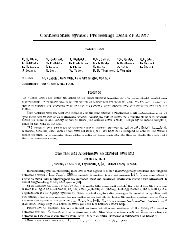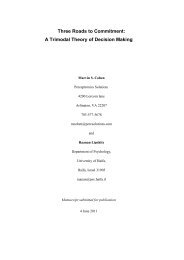Three Roads to Commitment: A Trimodal Theory of Decision Making
Three Roads to Commitment: A Trimodal Theory of Decision Making
Three Roads to Commitment: A Trimodal Theory of Decision Making
You also want an ePaper? Increase the reach of your titles
YUMPU automatically turns print PDFs into web optimized ePapers that Google loves.
<strong>Three</strong> <strong>Roads</strong> <strong>to</strong> <strong>Commitment</strong>: A <strong>Trimodal</strong> <strong>Theory</strong> <strong>of</strong> <strong>Decision</strong> <strong>Making</strong> 2<br />
Mixed Topdown,<br />
Bot<strong>to</strong>m-up<br />
Creative problem solving (Orasanu & Fischer, 1997). Bot<strong>to</strong>m-up search guided by creative conjectures and extrapolations, as in case-based reasoning and<br />
analogical reasoning (Weinreb, 2005, Holyoke & Thagard, 1995; Gentner, Holyoak, & Kokinov, 2001). Expert scientists draw on advanced domain<br />
knowledge (a <strong>to</strong>p down element) <strong>to</strong> search for potentially promising unsolved problems (a bot<strong>to</strong>m- process) and set goals for themselves (Ericsson, 2005).<br />
According <strong>to</strong> research by Ericsson, Krampe, & Tesch-Romer (1993), expertise develops in a process <strong>of</strong> deliberate practice, by means <strong>of</strong> which experts-<strong>to</strong>be<br />
seek out increasingly difficult tasks, elicit feedback from teachers and coaches, and analyze their failures <strong>to</strong> improve performance beyond what was<br />
“good enough.”




